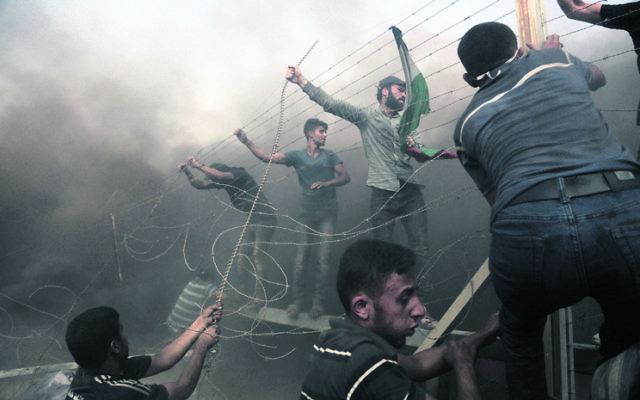Clashes escalate on the Gaza border
Scenes of violence returned to Israel's southern border in recent days amid mounting concerns of a threat from the north, writes Nathan Jeffay.

TENSIONS on the Israel-Gaza border are at their highest in two months, after seven Palestinians, including children aged 12 and 14, were killed during demonstrations.
The funerals dominated the news agenda in Gaza this week, becoming large political rallies where mourners chanted anti-Israel slogans and demanded revenge.
Videos of Nasser Musabeh, 12, being carried for burial, circulated on social media — as did clips of his classmates reacting to the news of his death. Hamas accused Israel of “gross criminal actions against innocent civilians.”
The IDF described the Gazans who protested as “rioters” and said that on both occasions they behaved violently. On Friday the attacks included acts of sabotage against security infrastructure, attempts to cross the security fence and infiltrate into Israel, and throwing more than 100 explosive devices towards Israel.
Facing a barrage of criticism for the deaths of the children, the IDF put the blame on Hamas, saying that it “continues to orchestrate belligerent activity throughout the Gaza Strip, cynically using Gazan civilians and endangering children by sending them to the security fence as a cover for terror activity”.
The seven Palestinians were killed on Friday, and then on Monday there were more clashes along the border — some of them with protestors who gathered to support Gazan boats that tried to enter Israeli waters as an act of defiance.
Some 20,000 people went to Friday’s demonstrations and 4000 went to Monday’s. “The situation has really gone up a notch,” Eyal Hagbi, an Israeli security official stationed close to the border, told The AJN.
“Palestinians are constantly trying to provoke soldiers on the border, throwing explosive devices and rocks.”
Hagbi, head of security for the Shaar Hanegev Regional Council, said that instead of stopping at nightfall protestors have started setting off explosives through the night. “We hear the noise all night,” he said, adding that residents are scared by the sounds, by attempts of rioters to breach the border, and by explosive balloons.
Israel fears that the numbers, and the violence seen at the gatherings, indicate that Hamas is trying to bring about a new escalation. This unrest on Israel’s southern border coincides with concerns about the northern border with Syria, where Hezbollah is rapidly building strength and Iran is flexing its muscles.
On Monday, Iran launched an attack on militants in Syria, who it blamed attacking a September 22 military parade in the Iranian city of Ahvaz. The retaliation was widely seen as Tehran showing its foes — Israel, the US and Saudi Arabia — how strong it is in and around Syria.
As the clashes on the Gaza border took place, there were also arson balloons landing in Israel. Some militants in the West Bank appear to be imitating their Gaza counterparts by launching balloons. On Monday, a suspicious balloon landed in the Israeli city of Modiin, which appeared to have been launched from the nearby West Bank. Police spokesman Micky Rosenfeld said, “Bomb disposal experts arrived at the scene and prevented any further danger.”
Israel’s defence chiefs say they are ready for all scenarios, but there is some discord in the government, with minister and Jewish Home party leader Naftali Bennett claiming that tensions are rising because the government has failed to crack down on Hamas.
“This isn’t how you manage a defence policy,” Bennett claimed, decrying informal ceasefire deals that Israel is believed to have made with Hamas. “This is what a failed policy looks like.”
In a separate development in Gaza, the United Nations agency for refugees, UNRWA, took a dramatic decision on Monday to evacuate a dozen top staffers to safety in Israel after they faced threats of violence. The agency faces a funding crisis and has laid off staff, prompting what UNRWA called “a series of worrying security incidents”.
NATHAN JEFFAY

comments